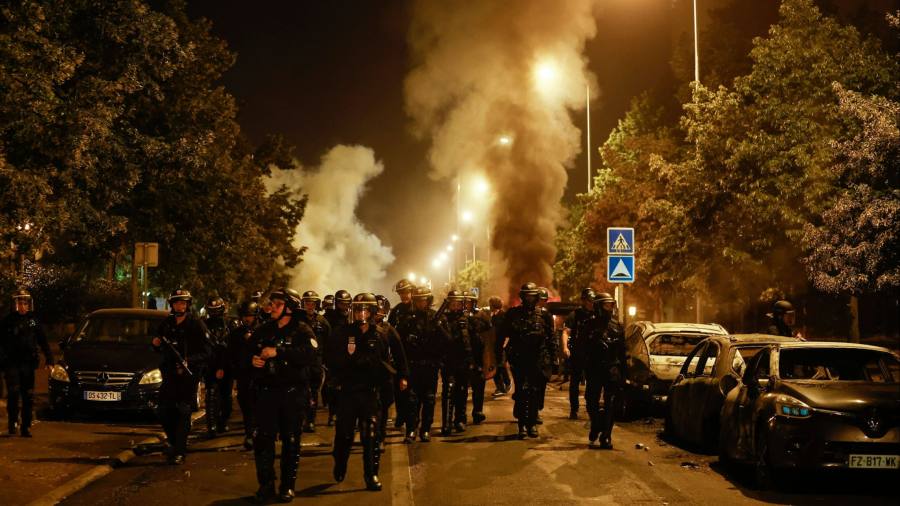Receive free France updates
We’ll send you a myFT Daily Digest email rounding up the latest France news every morning.
The French government was battling to contain spreading unrest on Thursday after the fatal shooting by police of a 17-year-old of North African origin who evaded a traffic stop in a Paris suburb.
France’s interior minister said that 40,000 police would be deployed nationally on Thursday evening, including 5,000 for the Paris region — far more than the previous night when clashes spread from Nanterre, where the teenager was killed, across the country.
Protesters set some cars alight in Nanterre following a largely peaceful street march called by the teenager’s grieving mother, who wore a white “Justice for Nahel” T-shirt emblazoned with his name.
As tensions rose outside Paris, investigating judges filed preliminary charges of voluntary homicide against one of the two police officers involved in the shooting. The 38-year old officer was placed in pre-trial detention, said the Nanterre prosecutor’s office, a rare step in such cases.
“Given the investigation so far and information collected, prosecutors believe that the legal conditions for the use of the firearm have not been met,” Pascal Prache, the prosecutor for Nanterre said at a press conference.
The death of the teenager has set France on edge after sparking anger in the ethnically diverse areas outside the capital and elsewhere, where it was seen as another example of police brutality and racial discrimination. Some 180 people were arrested overnight on Wednesday following incidents across the country as protesters erected barricades and set alight cars and some public buildings, the interior ministry said.
French president Emmanuel Macron, who called the teenager’s shooting “inexplicable and inexcusable”, is now scrambling to contain the fallout and prevent a repeat of 2005 when two teenagers from another low-income Paris suburb died while running from police. That triggered three weeks of rioting — a scenario Macron will want to avoid at all costs, as he has been seeking to draw a line under months of discontent sparked by his unpopular pensions reform.
“The past few hours have been marked by scenes of violence against police stations but also against schools, city halls and so ultimately against institutions and the republic, and these can absolutely not be justified,” Macron said as he opened a crisis meeting on Thursday morning.
In Nanterre on Thursday, several thousand people marched in protest at the killing and in support of Nahel’s mother, Mounia, who appeared at the demonstration standing on a pick-up truck. Police fired tear gas at some protesters as clashes broke out on the sidelines.
The death of Nahel, whose surname has not been made public, sparked an immediate outcry in France, in part because of a video by an onlooker that circulated on social media shortly afterwards and appeared to show no signs of any immediate danger to the policemen.
According to the official account of the incident, the two officers noticed the car driven by Nahel as it sped up a bus lane. They pursued it on motorbikes as it drove through a red light, and drew their guns as they approached the vehicle, calling for it to remain still after it was forced to stop in a traffic jam, the prosecutor said, citing the police testimonies.
One of the officers fired his gun once when the vehicle restarted, and the car crashed some metres away. A second passenger fled and has not yet been found.
Lawyers for Nahel’s family have called the shooting an “execution”. They said the prosecutor’s steps were insufficient and called for action against the second officer.
Prominent figures from across the political spectrum were quick to comment on Nahel’s shooting, which has drawn attention back to social issues that came to the fore in the 2005 riots. Those were sparked when two teenagers, Zyed Benna and Bouna Traoré, died while fleeing from police in Clichy-sous-Bois.
The movement morphed into a broader critique of the high unemployment and crime plaguing some communities around Paris. Such areas are home to many immigrants and their descendants, who face discrimination in employment and housing despite being French citizens, according to government studies.
Leftwing leader Jean-Luc Mélenchon repeated his frequent criticism of heavy-handed police tactics. Far-right leader Marine Le Pen slammed Macron for jumping to conclusions before an investigation was complete, while the head of her party, Jordan Bardella, defended the police, who he said faced “a climate of violence”.
Thirteen people died in France last year after refusing to stop at police traffic controls, compared with seven in 2021, although the overall number of stops has also risen sharply, according to police figures. Some died because police shot them and others because of accidents as they fled.
Read the full article here




